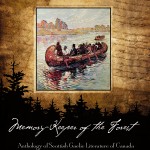“Exceptionally successful”: Review of Seanchaidh
 Our visit with Prof. Rob Dunbar, during his recent visit to the CSANA conference in Antigonish (May 5-7, 2016) reminded us that we had not yet posted his warm review of Michael Newton’s Seanchaidh na Coille / Memory Keeper of the Forest: Anthology of Scottish Gaelic Writing of Canada.
Our visit with Prof. Rob Dunbar, during his recent visit to the CSANA conference in Antigonish (May 5-7, 2016) reminded us that we had not yet posted his warm review of Michael Newton’s Seanchaidh na Coille / Memory Keeper of the Forest: Anthology of Scottish Gaelic Writing of Canada.
An Comunn Gàidhealach Ameireaganach / The American Gaelic Society’s newsletter, An Naidheachd Againne (literally, “Our News” or “Our Stories”) is for “members only” for two years, but we are pleased to post excerpts from Prof. Dunbar’s review below.
Editor-in-Chief Mike Hunter attended some of the CSANA conference and pleased to note just how many times Michael Newton’s and many other CBU Press books were cited in the papers presented.
Seanchaidh was of course shortlisted for an Atlantic Book Award (April 27, 2016) and, during the week-long book awards festival, Michael and Lewis MacKinnon toured (Sydney, Halifax and Charlottetown) a program of excerpts from the book.
This past winter, the book was also praised by Scots-Gaelic journalist Roddy MacLean, of Inverness (Scotland), in his Inverness Courier column: “Am Peursa.” Michael provides a translation from the Gaelic on his blog “The Virtual Gael” at http://tinyurl.com/zzlamk8.
~~
An Naidheachd Againne, Spring 2016, Volume XXXII (1): 9-11.
“In 1901, there were more than 90,000 Gaelic speakers to be found in Canada, meaning that Gaelic was the fourth most widely spoken language in the country at the time. Although more than half of those were apparently in Nova Scotia, Jonathan Dembling’s valuable research shows that Gaelic speakers were to be found in every province. Thanks to Dr. Michael Newton’s excellent book, we are now able to hear what those Gaels had to say in their own words.
“Dr. Newton … is trying to give us a perspective on the life and the opinions of the Gaels, in their own words, from all over Canada…. In this effort, Dr. Newton has been exceptionally successful.
“In Seanchaidh na Coille, [Newton] has once again found many a pearl, in journals and newspapers which have long since disappeared, and in other rare sources […] jewels that will not be found elsewhere, I don’t believe, in any library or archive. In addition to his research and interpretive skills, Dr. Newton has a flair for translation: The English versions are loyal to the original texts, but have an artful flavour to them.
“The book gives us a broad perspective on the life of the Gaels in Canada. As would be expected, there is plenty in it about the cultural, social, and political situation of the Gaels in Scotland before they left, and on emigration, and on settlement. But there are substantial chapters on topics such as love and death, religious belief, the situation of Gaelic in the Gaelic communities, cultural initiatives, and politics of the new country. There are many surprises to be found, such as two song-poems in the chapter on religious belief. In the song-poem ‘The Dissemination of the Scriptures’, James MacGregor, a Minister of the Presbyterian Church, is critical of aspects of the cultural heritage of the Gaels, but, surprisingly, he expressed his views skilfully and artfully in poetry that is very traditional with respect to metre and expression. As Dr. Newton himself explains, composers of spiritual verse would set their poetry to traditional secular song airs, but not often in the form of a waulking song, and yet this is what we have in ‘That is the Drink I would Imbibe’.
“In spite of the breadth and diversity of the collection, I would say that there is a concept which runs through it like a golden thread or, if one would prefer it, the ground movement in a pibroch, and that is the impact of the powerful culture — that is Anglophone culture — and the institutions of that culture on the Gaels. Through the literature itself and through Dr. Newton’s skilful and perceptive explanations, the mechanisms are clearly seen by which language shift and cultural dispossession work to the detriment of a minority such as the Gaels.
“[T]his is an excellent book. It will be of great utility to anyone interested in the literature of the Gaels, or in the literature of Canada, in social history, and in cultural relations, and nobody now has an excuse for being ignorant of the literary legacy of Canadian Gaels. For that, and for Dr. Newton’s praiseworthy work, we should all be thankful. I would greatly recommend this book.”
=30=





